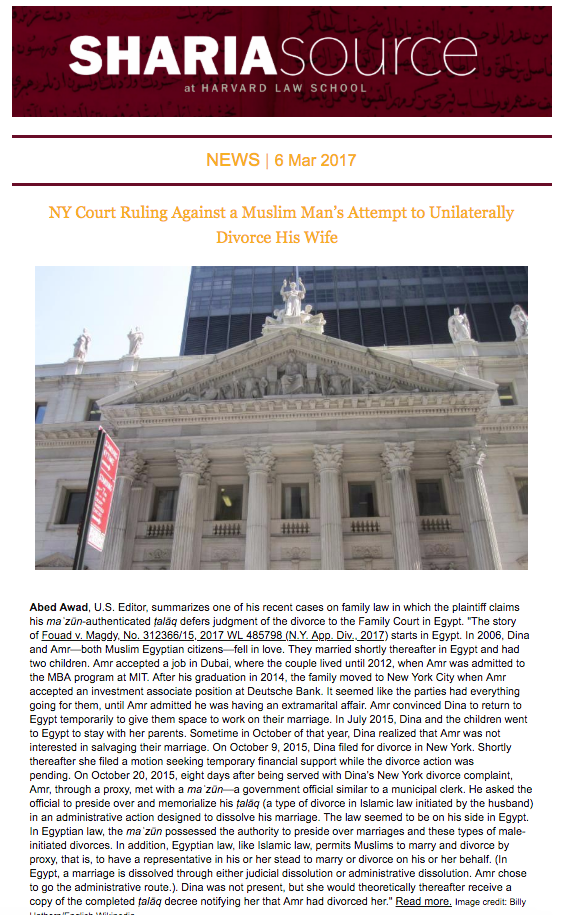
 CASE: Aleem v. Aleem (Md. Ct. App. 2008): Barring Unilateral Divorce Abed Awad, U.S. Editor, summarizes one of his recent cases on family law in which the plaintiff claims his maʿzūn-authenticated ṭalāq defers judgment of the divorce to the Family Court in Egypt.”The story of Fouad v. Magdy, No. 312366/15, 2017 WL 485798 (N.Y. App. Div., 2017) starts in Egypt. In 2006, Dina and Amr—both Muslim Egyptian citizens—fell in love. They married shortly thereafter in Egypt and had two children. Amr accepted a job in Dubai, where the couple lived until 2012, when Amr was admitted to the MBA program at MIT. After his graduation in 2014, the family moved to New York City when Amr accepted an investment associate position at Deutsche Bank. It seemed like the parties had everything going for them, until Amr admitted he was having an extramarital affair. Amr convinced Dina to return to Egypt temporarily to give them space to work on their marriage. In July 2015, Dina and the children went to Egypt to stay with her parents. Sometime in October of that year, Dina realized that Amr was not interested in salvaging their marriage. On October 9, 2015, Dina filed for divorce in New York. Shortly thereafter she filed a motion seeking temporary financial support while the divorce action was pending. On October 20, 2015, eight days after being served with Dina’s New York divorce complaint, Amr, through a proxy, met with a maʿzūn—a government official similar to a municipal clerk. He asked the official to preside over and memorialize his ṭalāq (a type of divorce in Islamic law initiated by the husband) in an administrative action designed to dissolve his marriage. The law seemed to be on his side in Egypt. In Egyptian law, the maʿzūn possessed the authority to preside over marriages and these types of male-initiated divorces. In addition, Egyptian law, like Islamic law, permits Muslims to marry and divorce by proxy, that is, to have a representative in his or her stead to marry or divorce on his or her behalf. (In Egypt, a marriage is dissolved through either judicial dissolution or administrative dissolution. Amr chose to go the administrative route.). Dina was not present, but she would theoretically thereafter receive a copy of the completed ṭalāq decree notifying her that Amr had divorced her.” Read more. Image credit: Billy Hathorn/English Wikipedia
CASE: Aleem v. Aleem (Md. Ct. App. 2008): Barring Unilateral Divorce Abed Awad, U.S. Editor, summarizes one of his recent cases on family law in which the plaintiff claims his maʿzūn-authenticated ṭalāq defers judgment of the divorce to the Family Court in Egypt.”The story of Fouad v. Magdy, No. 312366/15, 2017 WL 485798 (N.Y. App. Div., 2017) starts in Egypt. In 2006, Dina and Amr—both Muslim Egyptian citizens—fell in love. They married shortly thereafter in Egypt and had two children. Amr accepted a job in Dubai, where the couple lived until 2012, when Amr was admitted to the MBA program at MIT. After his graduation in 2014, the family moved to New York City when Amr accepted an investment associate position at Deutsche Bank. It seemed like the parties had everything going for them, until Amr admitted he was having an extramarital affair. Amr convinced Dina to return to Egypt temporarily to give them space to work on their marriage. In July 2015, Dina and the children went to Egypt to stay with her parents. Sometime in October of that year, Dina realized that Amr was not interested in salvaging their marriage. On October 9, 2015, Dina filed for divorce in New York. Shortly thereafter she filed a motion seeking temporary financial support while the divorce action was pending. On October 20, 2015, eight days after being served with Dina’s New York divorce complaint, Amr, through a proxy, met with a maʿzūn—a government official similar to a municipal clerk. He asked the official to preside over and memorialize his ṭalāq (a type of divorce in Islamic law initiated by the husband) in an administrative action designed to dissolve his marriage. The law seemed to be on his side in Egypt. In Egyptian law, the maʿzūn possessed the authority to preside over marriages and these types of male-initiated divorces. In addition, Egyptian law, like Islamic law, permits Muslims to marry and divorce by proxy, that is, to have a representative in his or her stead to marry or divorce on his or her behalf. (In Egypt, a marriage is dissolved through either judicial dissolution or administrative dissolution. Amr chose to go the administrative route.). Dina was not present, but she would theoretically thereafter receive a copy of the completed ṭalāq decree notifying her that Amr had divorced her.” Read more. Image credit: Billy Hathorn/English Wikipedia
 CASE: Aleem v. Aleem (Md. Ct. App. 2008): Barring Unilateral Divorce During trial court proceedings in which a Muslim couple was dividing their marital property, the husband, Mr. Irfan Aleem, attempted to perform a “triple ṭalāq” divorce—a form of final, irrevocable dissolution of marriage under Pakistani law, initiated unilaterally by the husband. The Court refused to honor this type of divorce, concluding that it violated due process rights guaranteed by the Fourteenth Amendment by not giving Mrs. Farah Aleem any role or voice in the divorce proceedings. Read the case or see our simplified narrative. Image credit: J. Scott Applewhite | Star Tribune
CASE: Aleem v. Aleem (Md. Ct. App. 2008): Barring Unilateral Divorce During trial court proceedings in which a Muslim couple was dividing their marital property, the husband, Mr. Irfan Aleem, attempted to perform a “triple ṭalāq” divorce—a form of final, irrevocable dissolution of marriage under Pakistani law, initiated unilaterally by the husband. The Court refused to honor this type of divorce, concluding that it violated due process rights guaranteed by the Fourteenth Amendment by not giving Mrs. Farah Aleem any role or voice in the divorce proceedings. Read the case or see our simplified narrative. Image credit: J. Scott Applewhite | Star Tribune
 EVENT: Amna Akbar on U.S. Law Enforcement and Counter-Radicalization Efforts SHARIAsource recently hosted noted scholar and civil rights attorney Amna Akbar, Assistant Professor of Law, The Ohio State University. Akbar provided a series of research findings from her study of counter-radicalization efforts by US law enforcement. Using her clinical practice as a source for discussion, Professor Akbar highlighted the impact these efforts have on social cohesion and community building. Read more. Image credit: Darrick Northington/SHARIAsource
EVENT: Amna Akbar on U.S. Law Enforcement and Counter-Radicalization Efforts SHARIAsource recently hosted noted scholar and civil rights attorney Amna Akbar, Assistant Professor of Law, The Ohio State University. Akbar provided a series of research findings from her study of counter-radicalization efforts by US law enforcement. Using her clinical practice as a source for discussion, Professor Akbar highlighted the impact these efforts have on social cohesion and community building. Read more. Image credit: Darrick Northington/SHARIAsource
See the full newsletter.

